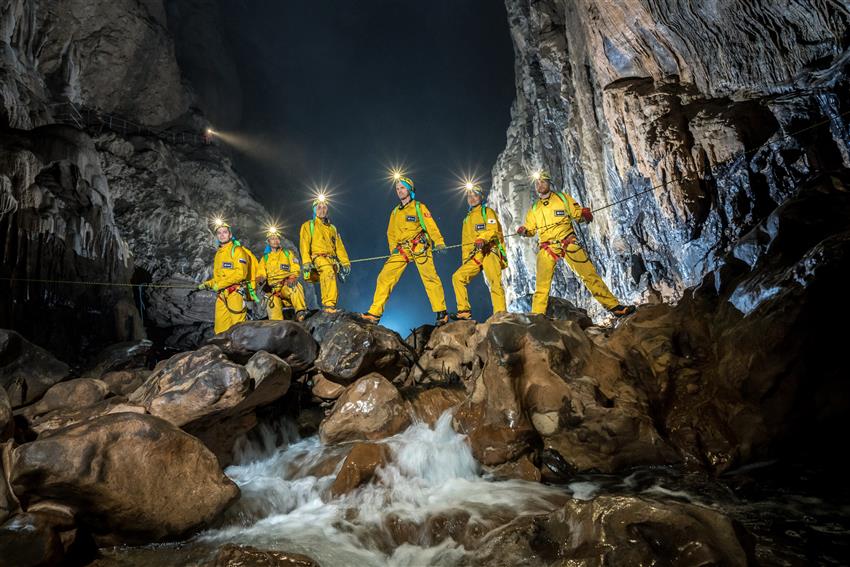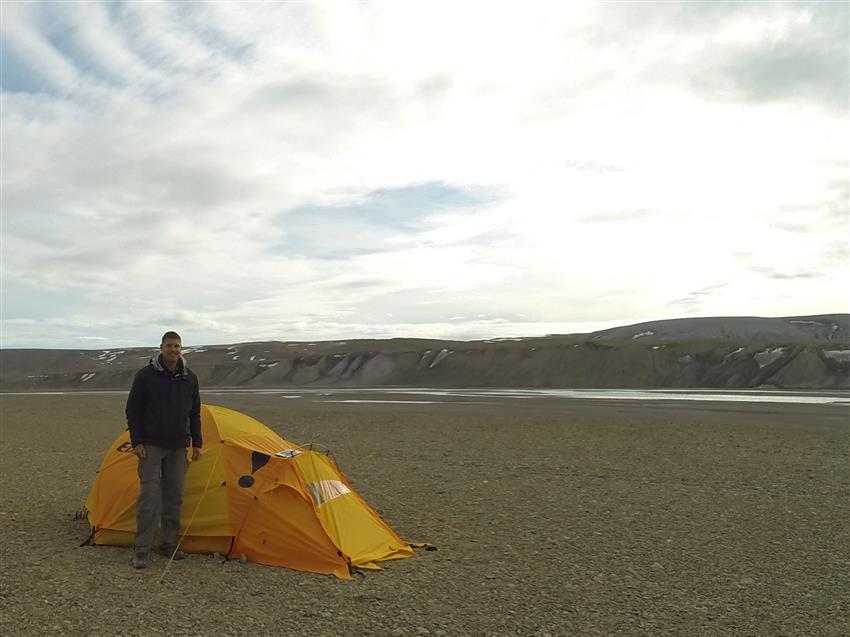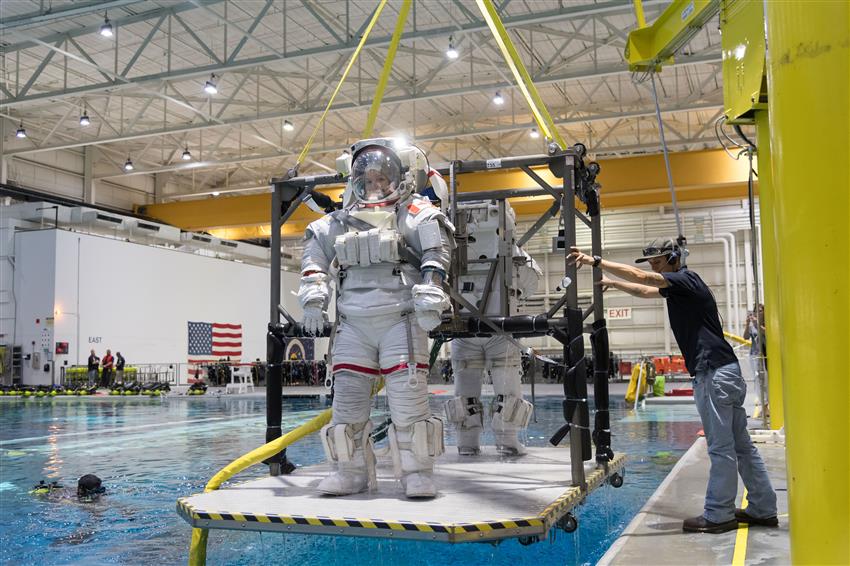How astronauts train to stay mentally strong

Canadian Space Agency (CSA) astronaut Joshua Kutryk (centre) takes part in the CAVES expedition (Cooperative Adventure for Valuing and Exercising Human Behaviour and Performance Skills) in Slovenia, along with five astronauts from four space agencies. An underground training course designed by the European Space Agency (ESA), CAVES gives astronauts an opportunity to tackle challenges associated with long space missions in a hostile environment, and participate in scientific studies with research teams, as they would in space. (Credit: ESA – A. Romeo)
Being in space can affect the mental health of astronauts in many ways, and staying mentally well is crucial to stay safe and productive. That is why ground teams work hard to avoid any physical or mental health emergency that could put the astronauts, their spacecraft or their mission in jeopardy.
Preparation starts by recruiting mentally healthy people and then providing training to help them deal with potential situations and issues. Astronauts repeat this training often enough that they can anticipate their own reactions and those of their teammates. They also receive constant support from teams on the ground and have access to a variety of tools to help them deal with potentially difficult situations.
Recruiting mentally sound candidates
To become an astronaut, one must have a university degree in science, engineering or medicine, and extensive knowledge and experience. But candidates must also meet very stringent medical and psychological requirements.
Research has identified key traits to look for when hiring astronauts, such as problem solving and self-reliance. So during recruitment campaigns, these qualities are thoroughly assessed, as well as a number of others, including:
- good judgment
- motivation
- resourcefulness
- teamwork
- leadership
- communications skills
Candidates are put through emergency simulations designed to test their resilience and their ability to think and react under pressure. These evaluations help determine if they can handle intense and stressful situations in challenging conditions similar to those encountered in space.
Thanks to the screening process, problems related to major mood and thought disorders have not been reported so far during space missions.
Astronaut candidates go through a very long and thorough recruitment process. (Credits: CSA, NASA)
"These candidates, they're probably wondering why we are pushing them to their mental and physical limits like this. The answer is simple. Once you're drained, once you've had enough, and all you wish for is a break, that's when the actual real test begins."
Following the science
Recruiting mentally strong people doesn't guarantee that their mental health won't be affected during missions. Space travel affects the mind in many ways. Just like anyone on Earth, astronauts can get lonely or depressed, or feel isolated.
By studying astronauts on long-duration missions aboard the International Space Station, psychologists have identified some long-term effects of being in space. Astronauts now undergo training to prepare for several stressors.
Experts have also identified over 100 medical conditions, including anxiety and depression, that could arise during missions to the Moon and beyond. While they think those two conditions will be rare on deep-space missions, crews should still be prepared for them.
The Mars 500 mission was a psychosocial isolation experiment in preparation for a future spaceflight to Mars. The last phase of the experiment simulated a 520-day mission in Russia, including three simulated Mars walks. The crew of volunteers had similar education and backgrounds as astronauts. Their communication systems were designed with an average delay of 13 minutes, to simulate the actual transmission time to and from a Mars-bound spacecraft. One of the participants suffered from depression, and other participants reported abnormal sleep cycles. Two of the participants who were more stressed and tired were involved in 85% of the conflicts among crewmembers.
Preparing the mind for space
![[Video] Robert Thirsk et David Saint-Jacques share in-depth astronaut mental training](/images/jeunes-educateurs/trousses/sante-mentale-et-isolement/comment-astros-entrainent-video-comment-astros-rester-forts-mentalement-eng.jpg)
YouTube video - Robert Thirsk et David Saint-Jacques share in-depth astronaut mental training. Working in an isolated environment—orbiting 400 km above Earth—comes with many unique stresses. CSA astronauts Robert Thirsk and David Saint-Jacques share how in-depth astronaut training mentally prepares astronauts to face these challenges. (Credits: Ingenium Canada, CSA)
The International Training Control Board (ITCB) determines the knowledge, skills, attitudes and behaviours astronauts should have. The ITCB then mandates the training for space missions. Essentially, astronauts need to build or enhance the following skills:
- Self-care and management: seek feedback, manage stress, maintain efficiency and good relations
- Leadership: plan and prioritize work, adapt to leadership styles, lead or support the leader
- Teamwork and group living: balance personal and crew needs, cooperate, support crewmates
- Cross-cultural: understand and respect other cultures, language skills
- Communication: communicate clearly, listen actively
- Conflict management: prevent and resolve disagreements
- Situational awareness: process information efficiently, monitor people, systems and environment
- Decision making and problem solving: assess facts, consider different viewpoints and options, evaluate risk and benefits
These skills are important on Earth, too! Think of a situation where you might have used some of these skills. Have you ever negotiated with a friend to find a solution during a conflict? Perhaps you and your siblings had to choose between two activities and considered each other's opinion, and pros and cons, before deciding together. If you are part of a sports team, have you ever followed the leader because you trusted their judgement even if you didn't 100% agree with the decision they were making?
There are three main types of training used to prepare mentally for missions.
- Lectures, briefings and workshops: these are similar to what you do in your school
- Real-life scenarios: these often take place in wilderness, underwater and isolated settings
- Sensitivity and team building: this helps improve interpersonal skills and establish coping strategies as a crew
Some of the training taken by astronauts is individual, but a lot of it is done as a team. The objective of training as a team is to develop effective crew coordination, teamwork and relationships. Collaborative training also establishes trust between team members and helps with workload management and communications.
In some cases, the support team on the ground also receives the training. This helps the team members in space and on the ground to develop cohesion and good communication skills. That way, both sides better understand each other's work environment and challenges, which is important for monitoring and maintaining mental health.
Asked about the importance of training in an hostile environment after his one-week CAVES underground training, CSA astronaut Jeremy Hansen said, "[Just like in space], a lot of risks have to be managed. You're deep in a cave; rescue is far away; you have to take care of yourselves and your team; work together; accomplish science objectives […]. We send six people to the Space Station. They're isolated. They're trapped in a tin can for an extended period of time. It's not entirely comfortable living on the ISS… And then on top of all the risks, you're doing real science. There's always that time pressure, and that's exactly what they try to create for us here."
Indigenous ways of knowing
Did you know? The CSA is beginning to incorporate Indigenous knowledge like the Medicine Wheel into how it conducts research in order to build stronger mental health practices for future astronauts. The Medicine Wheel represents the alignment and interconnectivity of the physical, emotional, mental, and spiritual realities.
ESA astronaut Thomas Pesquet explains how astronauts handle living in space. He also describes the Canadian psychosocial experiment At Home in Space. (Credits: CSA, ESA, NASA)
Continuous training
Just as recruiting mentally healthy astronauts can't guarantee that mental health issues won't arise, training can't prevent everything either. Former CSA astronaut Dave Williams said, "As astronauts we spend thousands of hours planning and training in countless simulations that prepare us for just about anything on a space mission. But you never really know what to expect until you get there."
That is why astronauts benefit from technologies, strategies and psychological support to stay mentally healthy throughout their voyage.
Furthermore, crewmembers keep track of their cognitive performance during missions. Sometimes they complete training modules to help keep their minds sharp and their confidence level high, and reduce their stress level.
Returning home
There are fewer studies related to the psychology of returning home. However, crewmembers and their families continue to receive psychological support after a mission. This helps astronauts get settled back into their home life and prepare for future missions.
You can "train" like an astronaut, too!
You don't need to live in a cave for a week or in an underwater laboratory to train like an astronaut. You can go backcountry camping! Backcountry camping takes place in a remote location, far from home or developed areas, with no facilities like running water or electricity. Your group of campers has to be fully reliant on each other and the equipment brought. Preparation is key for this kind of expedition. You need to carefully plan your equipment, evaluate potential risks, challenges and solutions ahead of time. For example, if a team member gets badly injured, how will you manage the situation knowing that a rescue team can't easily get to you and your friend can no longer walk? What if all your food goes rotten? If your water filtering system fails? If you get lost and have no cell service? What equipment should you bring along to prevent these situations? What training can you take beforehand? What information should you seek ahead of time? To prepare for and execute such an expedition, you will use the same kinds of skills that astronauts are required to use in space like problem solving, teamwork, stress management and self-reliance. All of these will help you stay calm and collected, and ensure your safety and that of your team.

Talk about backcountry camping! CSA astronaut Jeremy Hansen took part in a geology training expedition at the Haughton impact crater in Devon Island, Nunavut, in Canada's High Arctic. When he shared this picture on Twitter, he said, "My home in complete isolation for the next eight days. Our team discussed the need for diligence, as rescue is not always possible. At best, it could take eight hours. At worst, it could take days." (Credit: CSA)

